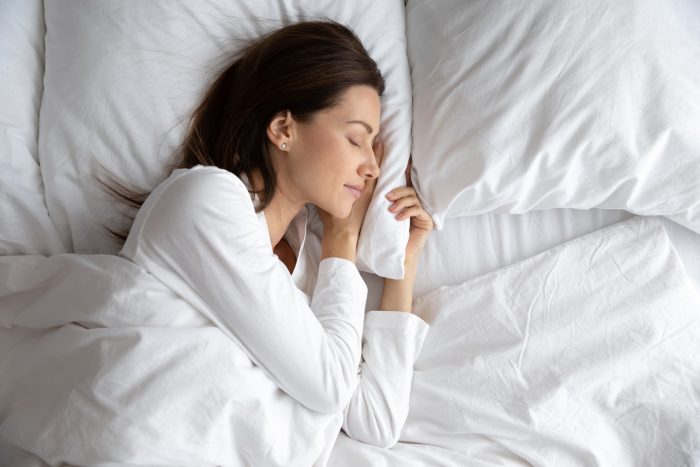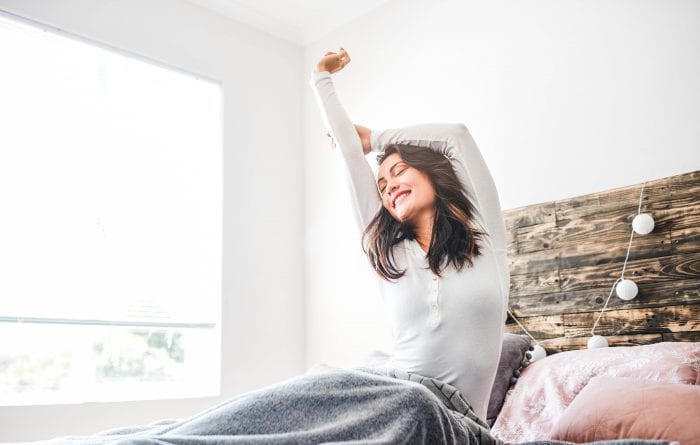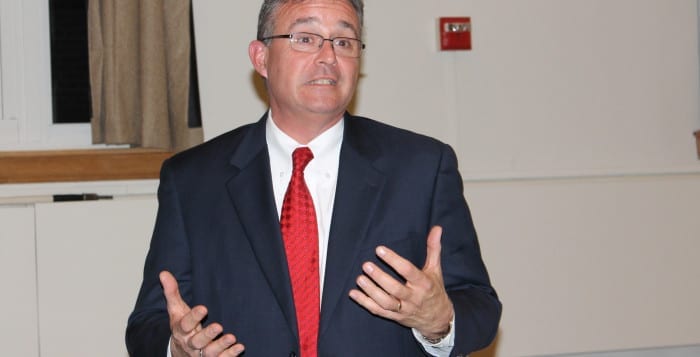By Kyle Barr and Rita J. Egan
Come September, middle and high school students across the North Shore will wake up to the harsh sound of alarms, sometimes hours before the sun will rise.
Some will wake up late, and rush in and out of the shower, sometimes not having time to eat before they make it to the bus stop, often in the dark where the cicadas continue to buzz and the crickets chirp.
Port Jefferson high schoolers will shuffle through the front doors before 7:20 a.m. Students at Ward Melville High School will hear the first bell at 7:05, while Comsewogue students will be in their seats at 7:10.
Some scientists across the North Shore have said that needs to change.
The science
Brendan Duffy has worked in St. Charles Hospital’s Sleep Disorders Center for nearly a decade, coming out of working at Stony Brook University as a sleep technician. As he worked in the field, he started seeing significant connections between the effectiveness of individuals during the day and how much sleep they got the night before. For teens, he said, the importance is all the greater. Sleep, he said, has a direct impact on risk-taking versus making smart choices, potential drug use, obesity and depression.
“The science is irrefutable,” he said. “Basically, anything you do, whether it’s mentally or physically — it doesn’t directly cause [these harmful decisions], but there’s connections and links.”
While some parents would simply tell their kids to get off their phone or computer and go to bed, scientists have said the bodies of young people, specifically teenagers, have internal clocks that are essentially set two hours back. Even if a young person tries to fall asleep at 9 p.m., he or she will struggle to slumber. Duffy said scientists call it the delayed sleep phase, and it directly affects the timing of the body’s melatonin production.
During sleep, the body enters what’s called “recovery processes,” which will regulate certain hormones in the brain and effectively flush all waste products from daily brain activity. Without enough sleep, these processes do not have time to work.
“The science is irrefutable.”
— Brendan Duffy
That is not to mention rapid eye movement sleep. REM sleep is a period during the night where heart rate and breathing quickens, and dreams become more intense. Lauren Hale, a sleep researcher and professor of preventive medicine at Stony Brook University, called this period critical to sleep. The longest period of REM happens in the latest part of the sleep cycle, the one deprived by waking up early.
“For decades, scientists have known young people are sleep deprived,” she said. “It’s not that they can get by on six or seven hours of sleep … teenagers are the most at risk of not getting the sleep they need.”
Of course, it is not to say modern technology has not affected young people. Duffy said phones and computers have meant the brain is never given time to rest. Even in downtime, minds are constantly active, whether it’s playing video games or simply scrolling through Facebook.
“They’re not given a break,” Duffy said. “Their brains are constantly processing, processing, processing.”
Sleep and sports
“I looked at all the school athletic programs that have been decimated by changing their start times, and I couldn’t find anything,” Duffy added. “It’s hard for athletes to perform or recover if they’re not sleeping well at the high school level.”
In research, college football teams looked at which kids were likely to be injured, and those who received less than eight hours of sleep were 70 percent more likely to be injured, according to Duffy.
That research led him to find Start School Later, a nonprofit national advocacy group to change the minimum school start time to 8:30 a.m., at a minimum. Duffy communicated with the nonprofit to provide data on the effect lack of sleep has on players. He has become its athletic liaison.
He points to professional sports teams, many of which have sleep professionals whose jobs are to set sleep schedules for their players and help reach peak effectiveness.
History of sleep and schools
Dr. Max Van Gilder is a retired pediatrician and coordinator for the New York branch of Start School Later. He said that while most schools traditionally started at 9 a.m. for most of the 20th century, the move toward earlier start times was relatively recent, only beginning around 1975 with busing consolidation. Schools started doing multiple bus runs for different grade levels, and high school students would be the first ones on these routes.
For decades, the early start became more and more established. Start School Later was created little more than a decade ago, but it’s only recently that some states have started to try later times.
In 2016, Seattle passed a law moving start times from 7:50 to 8:45 a.m. A study of the effects of that change showed students got an average of 34 more minutes of sleep a day or several hours over the course of the week. It also showed an improvement in grades and a reduction in tardiness. The study gave examples that in some classes average grades were up 4.5 points more than previous classes at the earlier start times.
“We need to work with the superintendents.”
— Max Von Gilder
In California, a bill that would have moved minimum start times to 8:30 a.m. was supported by both houses of the state Legislature before being vetoed by the governor last year. A similar bill is currently going through the legislative process again. Other states like Virginia and New Jersey have started to experiment with later start times.
On Long Island, very few districts have made significant increases in start times. Van Gilder said two-thirds of the high schools in New York state (excluding NYC) start before 8 a.m., with an average start time around 7:45. Only 2 percent of high schools start after the recommended time of 8:30, according to him.
The main difficulty of encouraging later start times is due to districts being so largely independent from both the state and each other. While this gives each district particular freedoms, it also means cooperation is that much harder. A district that changes start times would have to renegotiate with bus companies and find ways to navigate scheduling sports games between schools with different start times.
“The state constitution makes it very difficult for the State of New York to pass a law to say when you can start,” Van Gilder said. “We need to work with the superintendents.”
However, proponents of late start said the benefits easily outweigh the negatives.
“There are ways around it and, to me, this is a strong evidence base for opportunity to improve adolescent medical health, physical health, academic outcomes, safer driving — there is such a positive range of outcomes,” said Hale of SBU.
Parents working together
In the Three Village Central School District, more than two dozen parents filled a meeting room in Emma S. Clark Memorial Library Aug. 23. Barbara Rosati, whose daughter is an eighth-grader in P.J. Gelinas Junior High School, organized the meeting to discuss the benefits of teenagers starting school later in the day.
Rosati, a research assistant professor at SBU’s Renaissance School of Medicine in the Department of Physiology and Biophysics, said during conversations with Van Gilder she discovered there are only four high schools in New York that begin school as early or earlier than Ward Melville’s 7:05 start time. Because of their internal clocks, she described the teenagers as constantly being jet lagged.
“Older kids — adolescents, high schoolers, junior high school students — for them it’s much more difficult to get up early in the morning, and this has a physiological
basis,” Rosati said.
The goal of the Aug. 23 meeting was to go over studies, create an action plan and then put that plan into motion. The professor pointed toward the studies that show teenagers who are sleep deprived can be more susceptible to mood swings and drowsiness, and it can affect academic and athletic performance as well as cause long-term health problems such as anxiety, diabetes, eating disorders and cardiovascular problems.
“We’re spending a lot of money in this district to make our schools better and improve their performance, and then we undermine the kids with things like sleep deprivation,” Rosati said. “We undermine not only their health but academic performance.”
“We’re doing this because we care about our children’s mental health and academic achievement.”
— Barbara Rosati
Parents at the meeting agreed they need to be sympathetic to the school board, and Rosati added that she believed, based on prior experience, that the board would be willing to help.
“We have to show them our support, and at the same time we have to make sure they are willing to do this and feel committed to such an effort, because this is not something that you do halfheartedly,” she said.
Frances Hanlon, who has a sixth-grade student in Setauket Elementary School, agreed that the parents can work with the board trustees and that it wasn’t an us-versus-them issue.
“We can’t be, ‘We know better than you and why aren’t you?’” Hanlon said. “We all have to work on this together and that’s what’s going to make a change.”
Rosati and those in attendance are set to survey how many families are in the district and, when the school year begins, will start a petition for those in favor of late start times to sign.
Among the suggestions parents had were bringing the late school start presentation that Rosati created to the school board and PTA meetings throughout the district, with further plans to record and send it by email to parents. One mother also suggested that high school students join the parents at BOE meetings. Rosati said she would also like to have experts such as Van Gilder and Hale present a talk for the board trustees.
“We can use the help of these professionals to inform the board that there is really solid scientific evidence, and we’re not just doing this because we’re lazy and don’t want to get up early in the morning,” Rosati said. “We’re doing this because we care about our children’s mental health and academic achievement.”
Reaction from districts
Both of Duffy’s kids are already graduates of the Port Jefferson School District, and he has yet to present in front of the school board, saying he wants to gain more traction in the community before bringing it to school officials. He has been trying to get support through posts on social media.
“It really can’t come just from me, it has to come from the community,” he said.
Though Hale has gone in front of school boards at Shoreham-Wading River and a committee in Smithtown, she lives in Northport and has two young girls at elementary school level. She has also written editorials in scientific journals about the topic.
When Rosati attended a Three Village board of education meeting in June, she said a few trustees told her that starting high school later in the day could lead to eliminating some of the music programs while teams may not be able to compete against neighboring schools in sporting games.
After her appearance before the school board, she said she researched a number of schools on Long Island, including Jericho High School which starts at 9 a.m. and saw that they could still manage to have music programs and play schools at sports with different start times.
A statement from the Three Village School District said it had commissioned a lengthy discussion regarding school start times, but while it was in support of the research, it identified negative impacts to the athletic programs, transportation, BOCES offerings and elementary music.
“You don’t have to look hard to see the benefits of this.”
— Lauren Hale
The district said it also conducted an informal survey of a small portion of the student population, who said they were not in favor of later starts, but Three Village added it was only used to gather anecdotal information.
There are a few things parents can do to aid their child’s sleep beyond the later start. Rosati offered some tips, including regular bedtimes, providing balanced meals, curfew on screen times, and limiting extracurricular activities and the intake of sugar and caffeine in the evening hours. She and her husband have tried their best to follow those guidelines, but she said they still kept their daughter home multiple days due to sleep deprivation last academic year.
“We should not be put in the position to choose between education and health for our kids,” Rosati said.
When asked, Shoreham-Wading River, Port Jefferson and Northport school districts all said they were not currently looking into later
start times.
Still, Hale said despite her frustrations with the reaction from some districts she’s continuing to argue for later start times.
“We need to work together with communities so that parents and teachers and school board members understand this is for the benefit of the students and the community,” she said. “You don’t have to look hard to see the benefits of this.”
Rosati plans to host another meeting Sept. 10 at the Emma S. Clark Memorial Library in Setauket from 7:30 to 9 p.m.


















